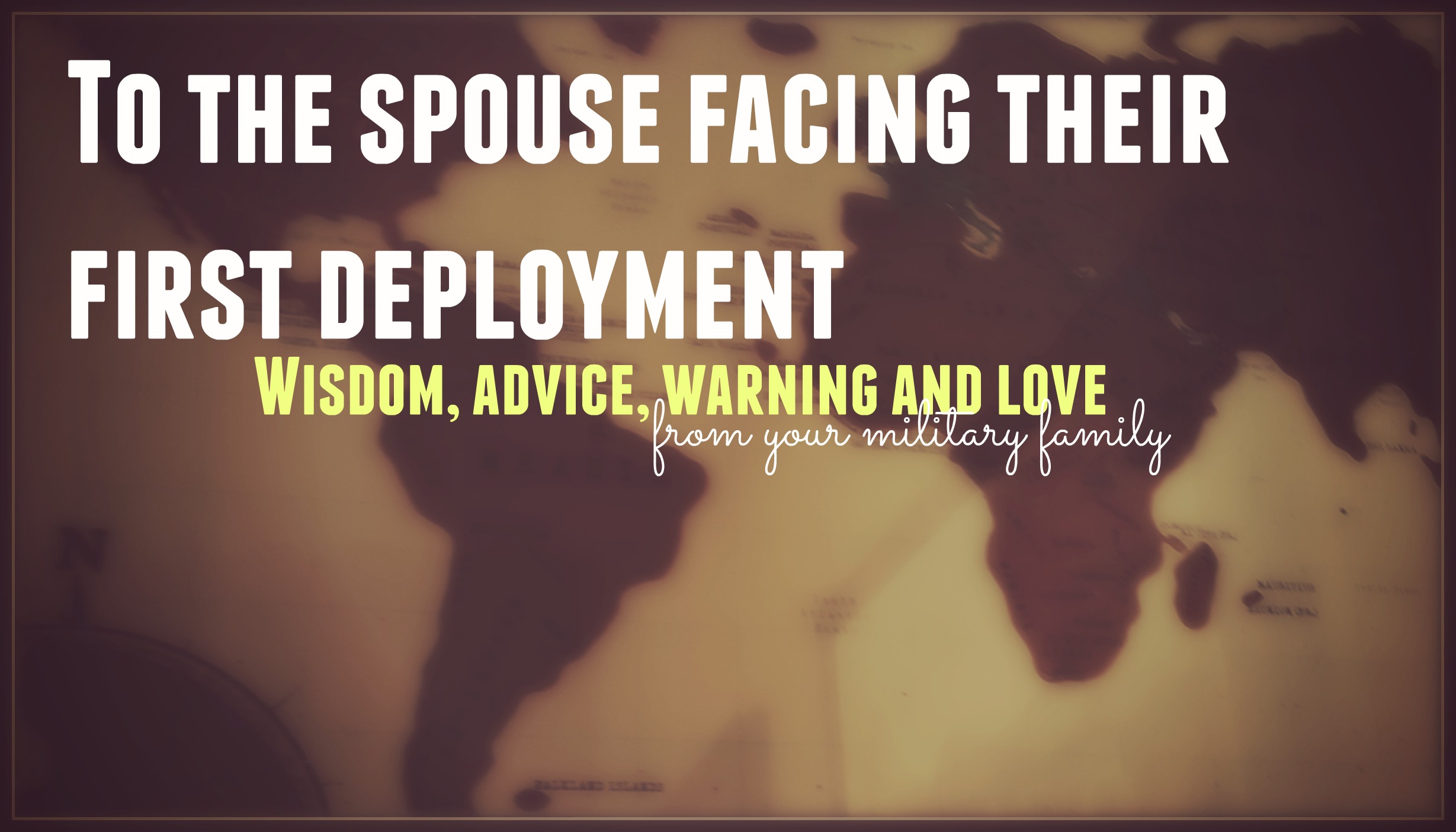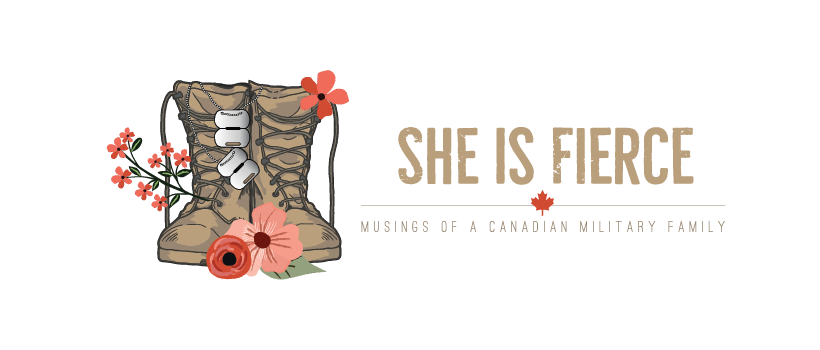To the spouse facing their first deployment (from your military family)

We’ve all received unsolicited advice at one time or another.
Sometimes, it’s helpful. Like if you’re headed into a bathroom stall and another lady grabs your arm and says “I wouldn’t go in that one.”
Sometimes, it’s like when older female family members tried to convince me on when I needed to resume my marital relations after the baby was born.
Just…. just no.
Within the military community, we have so many amazing families who have an incredible amount of wisdom and experience, highlighted with their own victories and challenges and the times they screwed up so badly it’s listed in the ‘what not to do’ in the family briefing. And with all that experience comes some pretty stellar advice that you know is worth the time because it comes from years of hard work.
This week, some of the military spouses in our community shared their advice when it came to deployments. The experiences of the spouses included is as varied as their suggestions. They come from Air Force, Army, Navy and Special Forces families, from Canada, the USA and Australia. Some have just completed their first deployment, some their 7th. The best part is, none of them are ME!
What they have in common is that they wish someone would have told them what they know now when they were first starting out. And so they chose to share here their best advice to families facing their first deployment.
It starts earlier than you think:
Anonymous: “It’s okay you’re fighting. His brain deploys weeks before his body.”
Kim: “It’s totally normal that he’s being a huge jerk. Sometimes I think we argue before because deep down we know it’s just easier if we are mad at them when they leave.”
Samantha: “Fighting and arguing is normal, and expected as the deployment gets closer, you are both under a great deal of stress and this seems to manifest in arguments. Remember though that your spouse is just as stressed as you are about them leaving. It’s not easy, but biting your tongue is helpful if you can.”
Have goals:
Karen: “Use this time to work on a personal goal. Self-improvement, education, health, weight loss, whatever it is that you’ve been thinking of doing “someday soon”. Now is the best time.”
Sarah: “I’m going to assume some of them are young and don’t have kids (I did 10 years pre kids). Find something and immerse yourself in it. Exercise – run a half?/a course/plan a trip with friends, family/plan to read through an entire novel series etc etc. You will be more fulfilled and busy and hubby will be away glad to receive updates and know you are not just sitting by, long in the tooth waiting for his/her return.”
Chantelle: “Don’t let life stop because you’re missing your spouse. Have adventures, have fun, entertain. It’ll make the time go faster. One day at a time.”
Tori: “I like making day 1 of deployment my ‘new year’ resolution day. Be it to get in shape, start and finish a project, get better at something or quit something. Make a SMART goal (from the R2MR guidelines) and then throw yourself into achieving it. It makes you realise that you really are strong and capable without your partner, and gives you something to do, and makes the time go faster because you’re racing the clock in order to achieve the goal before your partner gets back!”
Make Plans:
Anonymous: “Start a list of tv shows that you’d like to watch but your spouse doesn’t like. Save them up and watch them when you’re on your own.”
Jenny: “Find a hobby that you don’t normally do when your spouse is around. I don’t look forward to my hubby leaving but at least I have something to look forward to doing when he’s gone that I don’t get to do all the time.”
Halley: “Keep busy that first week”
Rebecca: “Stay busy!”
Ashley: “Don’t stop living because they’re gone. It doesn’t help you and it would kill them to know you were holed up at home feeling sad”
Natalie: “If you need to go home and see family, that’s okay. Invite family to stay with you to break up the time.”
Dany: “Make some plans that break up the timing a little bit. (a weekend trip with girlfriends, visit family, spa day, etc.) It gives you something to look forward to at different points in the deployment.”
Kari: “Feel okay to do things without them. New things. Different things. My thing is a new job task, or new hobby, or travel (if ever so lucky) so I am completely engrossed in something. This also gives us something to talk about during the deployment besides same old same old because old gets old…fast.”
But Not Too Many
Kathryn: “Don’t be afraid to say ‘no’ – you will need new boundaries for this time period and that’s ok.”
Make Friends:
Ashley: “Go to the coffee talks. 10 years out and I still talk to these women every week and I’m half way across the country now.”
Jenn: “Ask to go for coffee. Being alone is not needed because there are others feeling the same way.”
Mel: “I am still friends with the spouses that I met in my first deployment pot luck a decade ago. Those friendships have carried me through more than anything else.”
Sophie: “Leave your comfort zone. If you’re lonely, get out! It doesn’t have to be a military group. Find a playgroup or a knitting group or a book club… keep trying until you find your fit.”
Erin: “I leaned on friends so much during his deployments. I couldn’t have done it without them.”
Karen: “Get involved in deployment activities. Making friends with people who are in the same situation is great ( but don’t get caught up in all the drama). Having your kids also involved and making new friends with people who’s daddy/mommy is also away also helps the kids adjust. It’s a great way to either build or expand on your support group during and even after the deployment, especially when adjusting to “normal” life again”
Valerie: “I took a younger spouse under my wing during our husband’s absence. It was her first deployment. But since I was a brand new mom, she helped me with the kid as much as I helped her with the coping and all. I expected to be the one that could help, but she ended up doing so much for me! So gather with other spouses, if you can.”
Expect Murphy (And kick his ass):
Cindy: “My advice (if you are expecting) is to make sure you have an alternative plan in place and loving, family and/or friends available to help welcome your new bundle into the world.”
Patricia: “A kick-ass tool set and a helpful neighbour are sometimes useful…”
Samantha: “Everything that could go wrong generally does go wrong within the first few weeks… Be prepared for that… It sucks.”
Francesca: “Everything will break, most likely at the same time. A list of plumbers, handymen, etc is useful for when your water pump stops working or you microwave door falls off.”
Jamie: “Expect the worse to happen in the first 24 hours – its kinda funny how the kids need to vomit like crazy people ONLY when daddy is away.”
Communicate (When and however you can):
Trudy: “My mom sent him a card everyday, sometimes with news (Trudy got 100% in spelling, Vic got 100% in math) and quite often, just one simple phrase “I love you”. He still has those cards in a suitcase in the basement. They celebrated their 50th last year. The biggest thing that my Mom did was communicate with Dad and keep the family close.”
Melanie: “Expect that conversations are going to be very one sided for the duration of the tour. They won’t be able to tell you much about what’s going on there, so it’ll be up to you to carry the conversations. It’s weird but you get used to it.”
Karen: “Send care packages regularly – and have fun with it – focusing your energy outward and thinking about how to make your spouse happy will help YOU more than you realize.”
Ainsley: “I emailed my boyfriend (now my husband) everyday while he was away. I did so knowing I always wouldn’t get a response, but it felt good for me to do. I talked about normal things; my day at work, my plans for the weekend, what I was watching on TV I numbered each email in the subject line so they made a nice keepsake. Another thing I sent in a care package was “messages” in a bottle. I counted down how many days he approximately had left and wrote out one message for every day. I rolled them up and put them in a pop bottle. I wrote memories, IOUs for things (simple things like a case of beer, or other “things”  ) and I love you. The cheesier the better I thought. He kept them; they are tucked away in a book.”
) and I love you. The cheesier the better I thought. He kept them; they are tucked away in a book.”
Natalie: “The most important thing is trust. It’s easy to wonder what they are up to over there. If you trust each other, you will get through this much more easily. Say ‘I love you’ all the time. In texts, emails, over the phone, and during FaceTime/Skype. It truly helps.”
Rebecca: “Let yourself be sad but also know that’s not all they need to hear! Have fun making packages AND still send snail mail if you can! Emails are nice, but nothing beats a good old-fashioned letter!”
You Might Invest In A Portable Charger…
Halley: “always keep your phone and charger on you.”
Ashley: “Get call forwarding or always have your cell charger on you. Murphy’s law says they will call when you are at the grocery with 3% left on your iPhone.”
Anonymous: “Go out, go on with your life. But keep your cellphone charged and a charger in your car, just in case.”
Be practical:
Halley: “Most importantly OPSEC.”
Kim: “No news is good news. Assume your spouse is okay unless you are told otherwise, even if you haven’t heard from them.”
Allison: “Make sure you have an legal, updated power of attorney form completed prior to deployment. Notarized from a lawyer. The power of attorney the deployed member gets from DND applies only to DND.”
Hannah: “Know emergency contact info for your spouse and be sure your spouse’s unit knows yours.”
Jennifer: “Do not be late picking up your better half on the day he returns!”
Valerie: “What helped ME the most (and I know it’s not for everyone, but…) is to KNOW as much as you can. I asked so many questions about the deployment, about what I should do to prepare, about everything I could think of.”
Joan: “Don’t expect your return date to be exact.”
Elena: “Don’t count on return dates. If you have kids, don’t give them a set date. If it falls through, it’s harder on them.”
Kim: “Make sure your name is on EVERYTHING.”
Skip the Martyr Olympics and Accept Help:
Angel: “It’s ok to ask for help, you don’t have to do it all alone. When someone asks if you need anything tell them what you need. If a friend offers to babysit so you can shop on your own or just have some time to yourself accept the offer. Just as you would be there for others allow them to be there for you. If you can afford to pay someone to cut your lawn or shovel, remember two people use to do all the household duties now it’s down to one. We are not nor have to be superwoman/superman.”
We are not nor have to be superwoman/superman.”
Heather: “don’t be afraid to ask for (AND ACCEPT) help….also use available resources! the MFRC kept me sane
Melissa: “1.Don’t be afraid to ask for help. …. ask for help!!!!! 2. MFRC can offer soooooo much!! Babysitting for the kids (sometimes paid for) counselling…. friends… shoulders to cry on…. 3. See #1”
Ashley: “People want to help but they don’t know how. Let them but tell them how.”
Jill: “It’s been said before here but, never ever think that asking for help is a sign of weakness (I been in this game for 34 years, both in the uniform and out) and I can’t stress this enough to the new spouses I meet (who think it is)!!”
Karen: “Remember to take care of yourself too while they are away – especially if you have kids. Don’t be afraid to ask friends for help – even if you just ask someone to watch your kids for 30 minutes so you can shower in peace.”
Elena: “Be kind to yourself. Accept help that’s offered-especially from other spouses. We’ve been there and it’s not an empty offer even if we’ve only just met.”
Jenn: “Ask for help even if it’s just because you need/want to talk to someone.”
Patricia: “It’s ok to ask for help. And it’s also ok if you don’t need/want any. You know your limits.”
Karen: “absolutely DO ask for help, and try to do that before you critically need it. You aren’t an island, and no one is actually expecting you to be.
Avoid Media Overload:
Leigh: “Now might not be the time for a youtube overload of depressing military videos. And you don’t have to have the TV set to the news station 24/7. It’s okay to unplug.”
Brittany: “don’t watch the news.”
Karen: “Absolutely do NOT stay up watching military tribute videos late at night.”
Sara: Control what you see and decide for yourself how much info is too much. Don’t let yourself get overwhelmed, but don’t keep yourself entirely in the dark, either, if that’s not helping. Find the balance that works for you.
Be Kind to Yourself:
Julie: “Keep your expectations low. The house will be messier, the laundry will pile up, you will eat more take out and THAT IS OKAY. Cut yourself some slack.”
Tara: “Find what works for you. Everyone handles the stresses different, don’t worry about what people think you should do or how people think you should feel.”
Halley: “Keep expectations low.”
Ashley: “Drink the wine.”
Samantha: “If you have kids, it’s ok to pick and choose your battles and not run things like you did when your spouse was home. Some days the kids are in your bed, some days they are up until 11 on a school night. Some days you have cereal for breakfast others you have full meals. Also be prepared for the routine you’ve created in their absence to be toss out the window when they come home for hlta, and doesn’t always fall back into place when they go back (everyone stopped listening to me the last time… Seriously the dog too). Be flexible, but yet firm. It’s a balance.”
Natalie: “There is no one way to handle a deployment. It’s different for everyone, so don’t judge other wives or husbands you meet. If you need to go home and see family, that’s okay.”
Stephanie: “Always have a box of cereal, a bottle of wine and a frozen pizza on hand. Some days it’s easier to run auto pilot and have quick and easy options.”
Always have a box of cereal, a bottle of wine and a frozen pizza on hand”
Sarah: “Remember to laugh and keep perspective and most of all make time for joy.”
Jamie: “My motto is “cereal for supper is OK!!!”
Karen: “Give yourself grace because the first three weeks of the first separation are really, really hard. But after that, you’ll amaze yourself.”
It Doesn’t Always Magically Get Better When They Get Home:
Kris: “Sometimes the reintegration is harder than the deployment. That’s normal. It’s okay to get help to make it work again.”
Alison: “Reintegration is a real thing. We are a couple who pretty much always enjoys each other’s company, so I totally downplayed mentally the effect it would have on us. There is a very real and significant adjustment period though, as you both figure out the new normal of your home.”
Stacey: “Every day is a new day.”
So there you have it! From all of these houses all over the country, to yours.
If you are looking for a practical pre-deployment checklist of what to do before they go, you can check out the Pre-Deployment Checklist: CAF Edition.
You can do it, friends. We’re all behind you.
Do you have anything you would add?
Comments
About The Author
reccewife
Comments
Related posts:
Related Posts
Relax
Relax, mom. Relax. Just stay home. Except if you need to work. There’s…
Comments
Related posts:
Pre-Deployment and the Clone A Willy
Yes, you heard that right. So to start, let’s get it out of…








Leave A Comment